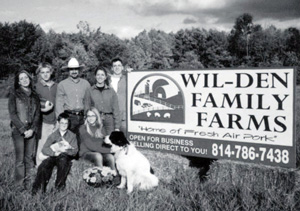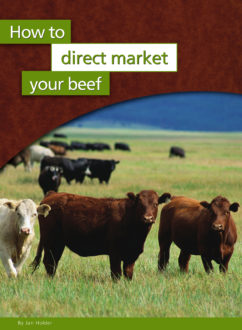
For eight years, Bill and Denise Brownlee watched feed prices rise and pork prices fall, wondering all the while how they could make their Wil-Den Family Farms in Pennsylvania more profit-able. In 2002, they decided to exploit what they saw as a market advantage – for years they have perfected an outdoor production system where their hogs farrow and finish on pasture without growth stimulants and minimal antibiotic use. The Brownlees withdrew their pork from conventional sales and began trying to market their product directly to customers.
Given the time commitment involved in direct marketing, they scaled back their operation from 170 sows to 60 and began focusing on selling 900 to 1,000 animals per year, this time at a premium. Their broad efforts include developing a meat-oriented community agriculture project, running a subscription service, partnering with CSA farmers, selling at farmers markets and grocery stores, selling to institutions, and establishing an on-farm store.
With help from a grant from the Sustainable Agriculture Research and Education (SARE) program to a local non-profit organization that wanted to test the concept of a community-supported agriculture project focused on meat, the Brownlees began hosting meat sampling events. They hoped to capture 100 families interested in buying annual “shares” of their farm product. For between $400 and $800, depending on their choices, each member would receive a mix: bone-in center-cut chops, bacon, ground pork, breakfast sausage, Italian sausage and semi-boneless ham, throughout the year. The concept, however, failed to take hold.
“We tried to pattern it after how people are used to buying from vegetable farmers: paying up-front,” Denise said. “For whatever reason, they were hesitant to commit.” They changed their strategy to encourage people to buy a month’s supply of meat in a subscription service and hope their happy customers will begin buying for a full year. About 40 customers have subscribed for monthly meat deliveries.
Denise and Bill host meat sampling at a variety of venues. Denise’s first presentation at a local business gained a handful of customers, who are still receiving meat deliveries.
A local restaurant featured the Brownlees, a beef producer and a poultry farmer in a pastured meat tasting. And at a nearby conservatory, they took part in a “Green Eats” event, distributing tastes of pork to a well-heeled crowd.
Early successes include selling whole hogs, an inexpensive way to move the entire animal, to institutions such as a convent and ground pork to Washington and Jefferson College in Washington, Pa. Selling lower-end cuts remains one of their biggest challenges.
“We’ve doubled the pigs we slaughter under our label, but it’s not enough,” Denise said. “We have just 60 sows paying the bills and we need to make more money from those animals.”
